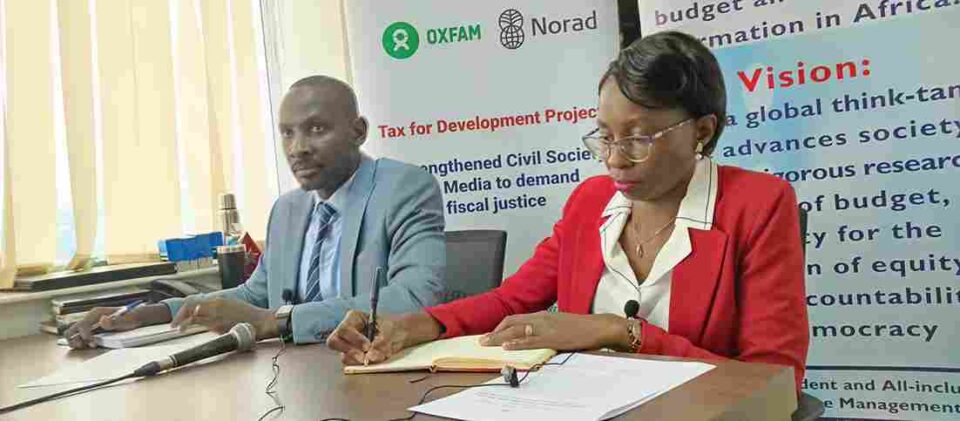By Frank Kamuntu
Center For Budget And Tax Policy (CBTP), Oxfam in Uganda have raised the alarm over unnecessary expenses cited in the FY 2024/25 budget which is projected to amount to UGX 599.94 billion (equivalent to 1.14 percent) increment from FY 2023/24 approved budget of UGX 52,736.79 billion.
In this budget, areas that are projected to receive the least funds include mineral development, community mobilization and mindset change, sustainable urban development, and housing, receiving UGX 31.55 bn, UGX 40.92 bn and UGX 40.21 bn respectively.
Addressing the pressor at Lotis Tower Nakasero on Wednesday, David Walakira – Executive Director CBTP, said the above are actually more important than some areas like donations which have been allocated Ugx162.682billion, special meals and drinks Ugx296.466billion, and medical expenses (employees) Ugx142.363billion.
”In total, expenditure and net lending in FY 2024/25 are projected to amount to UGX 38,968 billion. This is less than UGX 39,948 billion in the Approved Budget of FY 2023/24. However, the program allocations have been observed to hover up and down with 11 of the 20 programs getting budget cuts and the rest subtle increments. This means that the FY 2024/25 budget might not bring new tidings to the expectant Ugandan,” said Walakira.
He noted that integrated transport and infrastructure services were allocated UGX 6.15 trillion compared to the UGX 4.49 trillion that was allocated in FY 2023/24 which he put on the increase in the external budget from UGX 2.2 trillion to 3.8 trillion in FY 2023/34 and FY 2024/25 respectively.
He said 63% of the integrated transport and infrastructure services budget will be externally funded compared to 49% in the FY 2023/24 which he said also further sounds the risks related to external funding for such critical programmes.
”We have also observed that some of the nice statements in the NBFP are not substantiated with requisite allocations. The overall goal of the Budget Strategy for FY 2024/2025 is to accelerate economic growth to at least 7%, from a raw-materials-based to a manufacturing and knowledge-based economy. We note that the budget for manufacturing is barely changed between FY 2023/24 and FY 2024/25 at UGX 105 bn,” said Walakira citing the funding gap between local government and central government;
”The distribution of the budget between the central government and Local Government (LG) is such that about 70% (UGX 30.132 trillion) is allocated to the central government while about 30% (UGX 5.535 trillion) has been allocated to the local government. Whereas the budget allocation for central government increased by UGX 1.5 trillion (excluding interest payments), the LG budget increased by about UGX 403 bn between FY 2023/24 and FY 2024/25. We are yet to realize the full journey towards fiscal decentralization.”
Mr Walakira however is happy with government’s move to reduce unnecessary borrowings that have been a concern for every Ugandan for decades.
”On the fiscal consolidation front, we are on the right track, as observed partly from the sustained reduction if fiscal deficit for three consecutive years from FY 2020/21 to FY 2022/23. In the FY 2024/25, the discretionary financial resources are expected to reduce by UGX 3.47 trillion. This means that government is reducing the expenditure appetite and as such in the long run this dampened debt driver shall slow accumulation of debt (especially domestic) and in the long term the debt related costs (repayments and interest payments) shall all subdue. To sustain this walk towards fiscal consolidation efficiency in allocation and expenditure is a must,” said Mr Walakira.
On there other end, Oxfarm in Uganda Ag. Governance & Accountability Manager Mrs Sophie Nampewo Njuba revealed gaps that the government need to focus on in the 2024/25 budget like; health sector, education and empower local government financially to improve urbanization in cities and towns something she believes will curb challenges brought by climate change like floods among others.
She also called for fair taxing, saying some business in private sector cough a lot of taxes than others which she said in the long run affects the growth of such businesses.
Have An Advert Or Article You Want Us To Publish? WhatsApp: +256760530830.


